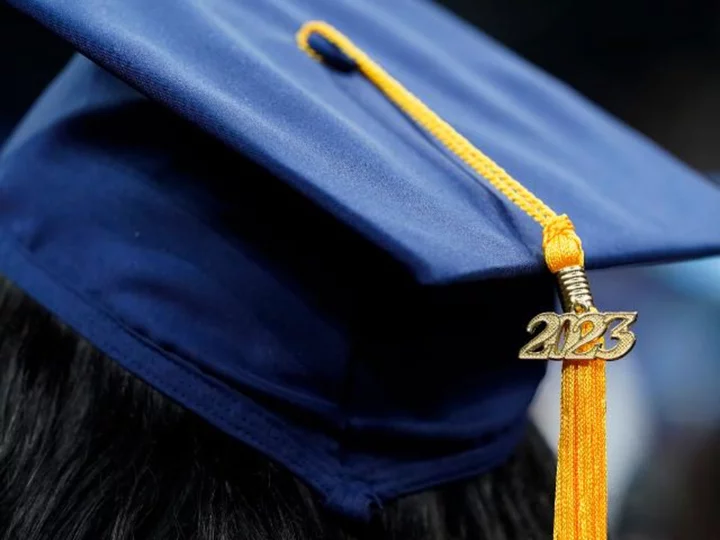Both the Senate and the House have now passed a bill to block President Joe Biden's student loan forgiveness program, which promises to cancel up to $20,000 of debt for millions of borrowers but has been held up by courts.
The bill now goes to Biden's desk for his signature, but the president has pledged to veto the legislation.
Some moderate Democrats joined Republicans in voting for the bill. The Senate passed the bill Thursday and the House passed the legislation last week.
Democratic Sens. Joe Manchin of West Virginia and Jon Tester of Montana voted for the bill, as well as Arizona Sen. Kyrsten Sinema, an independent. The resolution did not pass with a veto-proof majority.
Last week, Maine Rep. Jared Golden and Washington Rep. Marie Gluesenkamp Perez, both Democrats, also voted for the bill in the House.
Meanwhile, borrowers are still awaiting a Supreme Court decision, which will determine whether the student loan forgiveness program can take effect. The justices are expected to rule in late June or early July.
The White House has argued that the proposal to cancel some student debt will help protect borrowers from defaulting when student loan payments resume later this year after a yearslong pandemic-related pause.
But Republicans argue that the student loan forgiveness program is unlawful and shifts the cost of the debt to taxpayers who chose not to go to college or already paid off their student loans. Blocking the program could reduce the deficit by nearly $320 billion, according to the Congressional Budget Office.
Republican lawmakers introduced their joint resolution in late March, using the Congressional Review Act, which allows Congress to roll back regulations from the executive branch without needing to clear the 60-vote threshold in the Senate that is necessary for most legislation.
If the student loan forgiveness program is allowed to move forward, individual borrowers who made less than $125,000 in either 2020 or 2021 and married couples or heads of households who made less than $250,000 a year could see up to $10,000 of their federal student loan debt forgiven.
If a qualifying borrower also received a federal Pell grant while enrolled in college, the individual is eligible for up to $20,000 of debt forgiveness.
While the debt relief would help borrowers with student loans now, the program would not change the cost of college in the future -- and some critics argue that it could even lead to an increase in tuition.
Where do legal challenges to the debt relief program stand?
In February, the Supreme Court heard two legal challenges to Biden's student loan forgiveness program. One was filed by six Republican-led states, and the other was brought by two student loan borrowers who did not qualify for the full benefits of the program. The individuals are backed by the Job Creators Network Foundation, a conservative organization.
The lawsuits argue that the Biden administration is abusing its power and using the Covid-19 pandemic as a pretext for fulfilling the president's campaign pledge to cancel student debt.
The White House has said that it received 26 million applications before a lower court in Texas put a nationwide block on the program in November, and that 16 million of those applications have been approved for relief.
No debt has been canceled yet. But if the Supreme Court allows the program to take effect, it's possible the government moves quickly to forgive those debts.
If the justices strike down Biden's student loan forgiveness program, it could be possible for the administration to make some modifications to the policy and try again -- though that process could take months.
Biden's other student debt policies
Biden has extended the pause on federal student loan payments several times. Accounts have been frozen and most federal borrowers have not been required to make a payment for more than three years.
But the pause is set to end later this year.
The Biden administration has tied the restart date to the litigation over the separate student loan forgiveness program. Payments are set to resume 60 days after the Supreme Court issues its ruling or 60 days after June 30, whichever comes first. A bill to address the debt ceiling, which is currently making its way through Congress, would also prohibit another extension.
The Biden administration has also made some lesser-known but potentially longer-lasting changes to the federal student loan system.
New rules set to take effect in July could broaden eligibility for the Public Service Loan Forgiveness program, which is aimed at helping government and nonprofit workers. And a new income-driven repayment plan proposal which is meant to lower eligible borrowers' monthly payments and reduce the amount they pay back over time. Parts of that new repayment plan are expected to go into effect later this year.
The Department of Education has also made it easier for borrowers who were misled by their for-profit college to apply for student loan forgiveness under a program known as borrower defense to repayment, as well as for those who are permanently disabled.
Altogether, the Biden administration has approved more than $66 billion in targeted loan relief to nearly 2.2 million borrowers.

